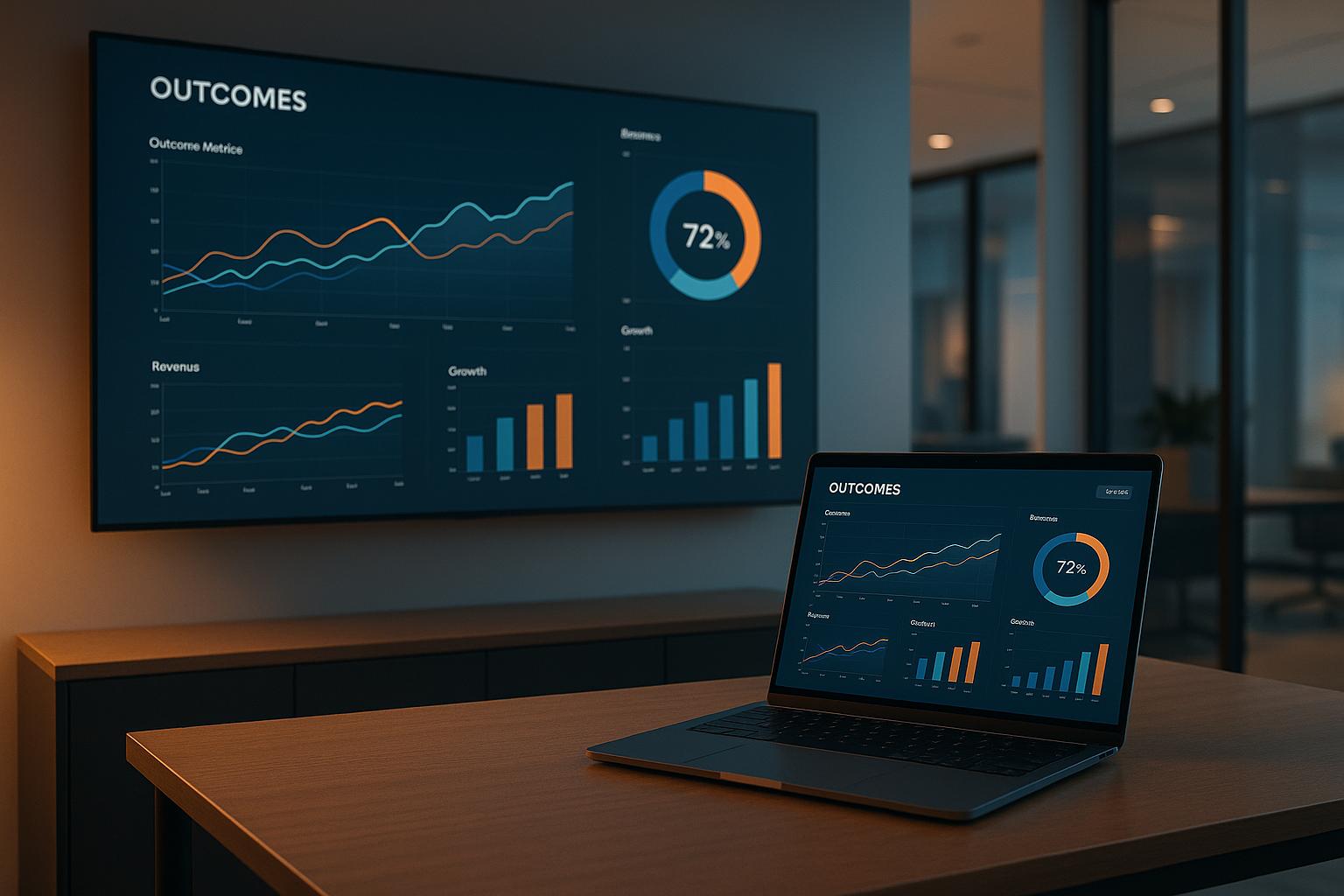AI search tools are reshaping how we find information online. Unlike older search engines that rely on keyword matching, tools like Perplexity and Microsoft Copilot focus on understanding your intent and providing direct, conversational answers.
Here’s what makes them stand out:
- Perplexity: Offers real-time, conversational responses pulled from multiple sources, with features like multimodal search, team collaboration, and a freemium pricing model.
- Copilot: Deeply integrated into Microsoft’s ecosystem, it handles complex queries, assists with content creation, and syncs across apps like Word, Excel, and Teams.
Both tools are transforming search by focusing on user needs, saving time, and offering more personalized experiences. Whether you prefer Perplexity’s research-oriented approach or Copilot’s Microsoft integration, these tools signal a shift in how we interact with search technology.
OpenAI’s Deep Research Beats Every AI Search Tool (Full Test & Comparison)
1. Perplexity
Perplexity AI is changing the way we use search technology. Instead of bombarding users with endless links, it provides direct, conversational answers by pulling information from multiple reliable sources. Think of it as turning search into a meaningful conversation rather than a scavenger hunt for information. Let’s dive into how its standout features are reshaping the search experience.
Core Capabilities
What sets Perplexity apart is its ability to understand the why behind your questions, not just the what. Using natural language processing, it goes beyond basic keyword matching to grasp the context and subtlety of queries. The result? Responses that feel like they’re coming from a well-informed assistant.
Perplexity boasts an 87% precision rate for general questions and an impressive 93.9% accuracy on the SimpleQA test. It also reduces keyword adjustments by 35% and draws from 57 sources - more than twice as many as traditional search engines. This wide range of sources, paired with clear attribution, allows users to verify the information, building trust in the process[1].
Another highlight is its ability to handle multimodal searches, meaning it can process both text and image-based queries seamlessly[1].
Integration Features
Perplexity isn’t just a search tool - it’s also a platform for integration. Developers can tap into its intelligence through API access, embedding its capabilities into their own applications[4]. For those working on specific projects, Perplexity Spaces offers a way to organize research. These Spaces support file uploads, real-time web searches, and even team collaboration, making them a powerful tool for staying organized and productive[2][6].
On-the-go users aren’t left out either. Perplexity provides a mobile assistant for Android and iOS, along with Comet’s side panel feature, ensuring smooth transitions between devices and uninterrupted productivity[3][5].
Real-Time Data Access
Unlike static AI systems that rely on outdated information, Perplexity fetches live data from the web every time you search[7]. This feature is especially useful in industries like finance, healthcare, and technology, where staying current is non-negotiable. By pulling data from trusted sources - whether news outlets, research databases, or online publications - it ensures users get accurate and timely information[7]. Strong engagement metrics highlight its effectiveness and appeal[8].
Pricing
Perplexity operates on a freemium model. Its basic features, including real-time search and source attribution, are free. For those needing more advanced tools, paid tiers unlock extras like file uploads, access to multiple AI model perspectives, enhanced Spaces functionality, and category-specific filtering options for more focused searches[6].
2. Copilot
Microsoft Copilot changes the way we think about search, turning it into a natural, conversational experience. Instead of typing keywords, you can simply ask questions as if you're speaking to a knowledgeable assistant.
"Copilot combines traditional search functionality with AI-driven insights, acting as a knowledgeable assistant."
Core Capabilities
Copilot goes beyond basic searches by understanding your intent and the context of your queries. It can handle complex questions in a single, continuous conversation. Need a long article summarized? Copilot can do that instantly. Want a specific tone or style in its responses? You can choose from options like factual Precision or creative brainstorming. It even lets you customize how the responses are formatted.
It doesn’t stop there. Copilot helps with content creation, whether it’s writing assistance or generating images from prompts. The newly added Copilot Vision feature takes things up a notch, allowing you to scan and analyze content on your screen or even through your mobile camera for visual insights.
For tackling tougher questions, the "Think Deeper" feature - powered by OpenAI's o1 model - offers advanced reasoning capabilities. Microsoft 365 Premium users also gain access to the "Deep Research" feature, which acts as a personal research assistant, perfect for diving into detailed investigations. Together, these tools make Copilot an invaluable resource for both business and personal use.
Integration Features
Copilot stands out for its seamless integration across Microsoft's ecosystem. Embedded directly into Microsoft Edge, it can answer questions about any webpage you’re viewing without making you switch tabs. But its reach goes far beyond the browser. Copilot works across Microsoft 365 apps like Word, Excel, PowerPoint, Outlook, Teams, and Loop.
It taps into Microsoft Graph to access your emails, chats, and documents, delivering responses tailored to your specific work context. Plus, with Power Platform and Microsoft Graph Connectors, it can pull in data from external sources, becoming a central hub for all your business tools.
| Microsoft 365 App | Key Features |
|---|---|
| Word | Drafts documents, summarizes content, and answers document-related questions |
| Excel | Suggests formulas, charts, and provides data insights |
| Outlook | Summarizes email threads and offers tips for tone and clarity |
| Teams | Summarizes meetings and chats, and answers questions during calls |
| PowerPoint | Creates presentations from prompts or Word files, adds slides, and formats content |
Copilot also automates routine tasks across multiple devices. Whether you’re on a PC, Mac, smartphone, or even using WhatsApp, Copilot ensures you stay productive wherever you are.
Real-Time Data Access
One of Copilot’s standout features is its ability to deliver real-time, context-aware information. It combines live web content with your personal work data to provide up-to-date, relevant answers. For example, organizations using Security Copilot have reported impressive results: a 54% reduction in time spent resolving device policy conflicts and a 22.8% drop in alerts per incident within just three months [9].
Microsoft’s own teams have also seen productivity boosts. Support agents have noted time savings and fewer help tickets, while energy efficiency initiatives at Microsoft facilities have led to measurable cost savings.
Pricing
Copilot uses a freemium model, offering a solid free version with essential search capabilities and integration with Microsoft Edge. For those needing more, Copilot Pro is available for $20 per month. This premium tier includes priority access, faster performance, and advanced AI features across Microsoft 365 apps. It’s a smart investment for professionals who rely on Microsoft 365 daily, unlocking the full potential of Copilot for streamlined workflows.
sbb-itb-9cd970b
Advantages and Disadvantages
Let’s take a closer look at the strengths and limitations of Perplexity and Copilot, two tools that bring unique capabilities to the table.
Perplexity's Strengths and Weaknesses
Perplexity stands out for its ability to deliver direct and concise answers in a conversational format, sparing users from wading through endless search results [10]. It also provides access to multiple language models under a single subscription, offering flexibility for a range of use cases [10]. Its integration with over 450 apps via Appy Pie Automate [13] and the lightweight, cost-effective Sonar API for developers [14] further enhances its appeal.
That said, Perplexity has its drawbacks. It struggles with handling complex conversations, and users may encounter privacy risks due to data transit across servers. The iOS app is prone to instability when running in the background, and the onboarding process for its Spaces feature can feel unnecessarily complicated [10].
Copilot's Advantages and Challenges
Copilot’s biggest advantage lies in its seamless integration within Microsoft’s ecosystem. Mustafa Suleyman, Executive Vice President and CEO of Microsoft AI, highlights its personalization capabilities:
"Copilot will now remember what you talk about, so it learns your likes and dislikes and details about your life" [11].
This ability to retain user preferences, combined with actionable features like booking tickets or making reservations [11], makes Copilot a powerful tool for those already invested in Microsoft’s suite of products. Its vision capabilities allow it to analyze surroundings and provide relevant contextual information [11]. Additionally, its integration with Microsoft 365 apps ensures a smooth, unified workflow [15].
However, Copilot’s value diminishes for users outside the Microsoft ecosystem. Its reliance on complex third-party integrations can be a hurdle for those not already embedded in Microsoft's tools [16].
| Factor | Perplexity | Copilot |
|---|---|---|
| Strength | Direct answers from multiple AI models [10] | Deep integration with Microsoft’s ecosystem [15] |
| Integration | Extensive third-party app connections [13] | Native Microsoft 365 integration, limited third-party support [16] |
| Personalization | Limited memory of user context [10] | Advanced learning and personalization [11] |
| Pricing | Free tier with 3 Pro searches daily | Free with Microsoft 365 subscription |
| Main Weakness | Context limitations and privacy concerns [10] | Dependency on Microsoft ecosystem |
| API | Sonar API with pay-as-you-go pricing [14] | Azure OpenAI Service integration [16] |
Privacy and Accuracy Considerations
When it comes to privacy and accuracy, both platforms require careful consideration. Copilot users are advised to double-check the accuracy of its outputs before sharing [12]. Perplexity, on the other hand, raises privacy concerns due to its reliance on multiple servers for data processing [10]. Microsoft emphasizes strong data security and responsible AI practices with Copilot [12], but organizations must assess if these measures align with their specific compliance needs.
Key Takeaways
Choosing between Perplexity and Copilot often hinges on your existing tech setup and priorities. Perplexity shines with its flexibility and access to diverse models, while Copilot excels with its deep integration and personalized features tailored for Microsoft users. Both tools reflect the evolving role of AI in search, each offering distinct advantages based on your workflow and goals.
Conclusion
AI is reshaping how Americans search for and access information, introducing tools like Perplexity and Copilot that go beyond traditional keyword matching to focus on understanding user intent [17].
The numbers tell the story. Within months, ChatGPT transitioned from a curiosity to a primary search engine for 8% of U.S. users [17]. Around 71.5% of internet users have tried an AI search tool, and 27% of Americans now rely on them for specific queries [19]. This isn’t some distant trend - it’s happening now, highlighting the unique advantages AI tools bring compared to conventional search engines.
Unlike traditional search engines, AI-powered platforms provide conversational, synthesized answers pulled from multiple sources [19]. They aim to understand what users mean, not just the words they type [17]. This creates an experience that feels less like scanning a database and more like consulting a knowledgeable assistant [19].
Each tool brings its own strengths. Perplexity stands out for its research capabilities, offering direct answers, citations, and real-time updates, all while staying independent of any single ecosystem. Copilot, on the other hand, thrives within Microsoft’s ecosystem, delivering personalized experiences and seamless integration for users who rely on Microsoft 365.
Even advertising is undergoing a transformation. Microsoft reports that ads within Copilot achieve a 69% higher click-through rate compared to traditional search ads [19]. Meanwhile, in 2024, an estimated 60% of Google searches ended without a click [18], showing a growing preference for direct, synthesized results over traditional search listings.
As search behaviors shift, content creators and businesses are adapting. They’re focusing on making their content easily accessible to AI systems by emphasizing original research, proprietary data, and interactive tools that stand out in an AI-driven landscape [18].
The future of search doesn’t mean abandoning traditional methods - it’s about expanding the options available. Whether you need Perplexity for in-depth research or Copilot for seamless Microsoft integration, the key is choosing tools that align with your specific needs. Those who embrace these AI advancements while staying focused on their goals will be best positioned to thrive as search continues to evolve.
FAQs
How are AI-powered search tools like Perplexity and Copilot transforming the way we search compared to traditional search engines?
AI-powered search tools like Perplexity and Copilot bring a fresh approach to how we search for information by focusing on context, user intent, and individual preferences. Unlike traditional search engines that depend on keyword matching and ranking algorithms, these tools tap into advanced AI to offer results that feel more conversational, personalized, and actionable.
With features like natural language understanding and the ability to learn in real time, these tools deliver answers that are not only more relevant but also help users make decisions faster and with less effort. Whether you're tackling personal tasks or professional projects, AI search tools are shaping a smarter, more intuitive way to find what you need.
What are the key benefits of using Perplexity for research compared to Microsoft Copilot within the Microsoft ecosystem?
Perplexity stands out for its real-time research capabilities and citation-based responses, making it a go-to option for gathering scholarly or external information. Its detailed answers, supported by reliable sources, are especially handy for academic projects or deep-dive research.
Meanwhile, Microsoft Copilot shines within the Microsoft ecosystem, where it’s built to boost productivity. Whether it’s summarizing internal documents, automating workflows, or handling tasks like drafting emails or creating reports, Copilot is tailored for users who depend on Microsoft tools in their daily routines.
In short, Perplexity is your partner for external research and knowledge exploration, while Copilot focuses on streamlining internal workflows and boosting efficiency.
What are the key privacy and data security differences between Perplexity and Copilot, and what should users know?
Perplexity prioritizes transparency and data control, following SOC 2 Type II compliance to uphold strong security protocols. That said, it may gather data through cookies and device fingerprinting to support functionality and analytics.
Microsoft Copilot, on the other hand, highlights user control, ensuring that customer data isn't shared with third parties without explicit consent. It also refrains from using customer data for AI training unless users actively agree to it.
It's essential for users to thoroughly review the privacy policies of both platforms to understand how their data is handled and confirm that their preferences align with each tool's practices.



